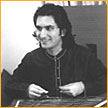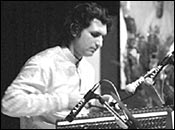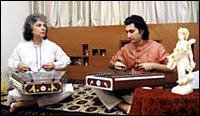
|
A new sound
Meet Rahul Sharma, debut composer of Mujhse Dosti Karoge
|
Deepali Nandwani
June is the month of reckoning for santoor player Rahul Sharma, son of maestro Pandit Shiv Kumar Sharma. At the end of the month, his first album with pianist Richard Clayderman hits the shelves.
"The album," says Sharma, "has Indian sounds which is what Clayderman wanted. We have fused together the sounds of santoor and piano. We have done six original numbers for the album, and four cover versions, which includes three old Hindi songs and one Beatles number, Norwegian wood."
Also, in June Sharma debuts as music director in a Yash Chopra production, Mujhse Dosti Karoge. "A year-and-a-half ago, my dad called me up, when I was on a concert tour in London and asked me if I wanted to score the music for a Yash Chopra film. It was like a dream come true," he says. "Composing has been my first love. When I was younger, I would compose tunes on a synthesiser my father brought from Japan for me."
Sharma had been offered films earlier, especially while assisting his father who, along with flautist Pandit Hariprasad Chaurasia, composed music for films like Lamhe, Chandni and Darr. "But this seemed the right time to debut. And the project, too, seemed right," he reveals. "I had a few music sittings with Aditya Chopra; we gelled well."
The music for Mujhse Dosti Karoge, is "young and fresh". Directed by first-timer Kunal Kohli, the film stars Hrithik Roshan, Kareena Kapoor and Rani Mukherji. "The film is about urban young people, so the music had to be romantic and soft," adds Sharma. "The music arrangement is very Indian, but the feel is Western. There are a few romantic numbers and an item number."
To add that slight classical touch to the compositions, he has used santoor and flute in a few pieces, as well as a proper orchestra with 60 violinists playing.
 "It is much more challenging composing for a live orchestra. If even one musician plays out of tune or something goes wrong, the song has to be recorded all over again," points out Sharma. "When my father was composing all those years ago, he used live instruments. Now, everything is programmed. I used electronic music in the film, simply because of its superior sound quality."
"It is much more challenging composing for a live orchestra. If even one musician plays out of tune or something goes wrong, the song has to be recorded all over again," points out Sharma. "When my father was composing all those years ago, he used live instruments. Now, everything is programmed. I used electronic music in the film, simply because of its superior sound quality."
Despite the technical differences, his training under Pandit Sharma, Pandit Chaurasia and Yash Chopra, especially when he sat with them during their music sessions, has helped him now, as a composer. "I learnt how songs are recorded, how singers are trained, how the whole system works," he says. "In fact, I composed a few tunes for Lamhe. I would play them out for my dad, and if he liked it, we would take it to Yashji."
Sharma plans to be a more permanent fixture in Bollywood unlike his father, whose last film as a composer was Darr. He has already received several offers, though he has not taken on any new project. "I want to do two or three quality films a year. I would love to work with Subhash Ghai and Karan Johar, simply because they understand music, and it plays such an important role in their films," he says. "Composing for films is thrilling, especially when you see the end product on screen. It is a vast medium and reaches millions of people. Lots of things follow --- fame and money, for example."
Given that, Sharma still likes "the impromptu nature of Indian classical music. However much you rehearse, you have to be spontaneous and react to the situation on stage. You have a certain framework within which there are several permutations and combinations," he reveals. "Each time you a play a raga, it sounds different."
 Sharma feels he can use films to introduce classical instruments to a younger audience. "I hope to popularise santoor through the music of Mujhse Dosti Karoge. It will help attract younger generation listeners to my concerts and to classical instruments in general because they are more open to instrumental music."
Sharma feels he can use films to introduce classical instruments to a younger audience. "I hope to popularise santoor through the music of Mujhse Dosti Karoge. It will help attract younger generation listeners to my concerts and to classical instruments in general because they are more open to instrumental music."
Sharma is also experimenting with fusion, which involves merging Western and Eastern sounds. His next album, Zen, has him playing the santoor, while Kesri Lord plays the electronic keyboard. For this album, Sharma has used the Iranian santoor, which has a completely different tonal quality from the regular Indian one.
One of his biggest concerns, Sharma says, is to find ways and means to attract the yuppie crowd to his kind of music. "The problem is people believe they have to be trained to understand classical music, even if it is instrumental. That is not true," he asserts. "You must allow music to touch you. The sound of the santoor, flute or any other instrument grows on you gradually."
Just as it grew on him. Although Sharma grew up listening to the santoor and the flute, training to be a classical musician was difficult. "It needed a lot of discipline and was also boring at time," he admits. "I did not know whether I wanted to be a musician or music director or even whether I wanted to have anything to do with music."
Today, he says, "Nothing besides music interests me too much."
India News Feature Service